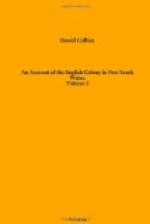To complete this catalogue of offences, a few days after, some Irish convicts, with their faces blackened, attacked the house of an industrious man (one of the missionaries), whom they severely wounded in several places and plundered of all his property.
Were it not evident that certain punishment awaited the conviction of offenders, it might be supposed that a relaxation of the civil authority had begotten impunity; but far otherwise was the fact: the police was vigilant, the magistrates active, and the governor ever anxious to support them, and with incessant diligence endeavouring to establish good order and morality in the settlement. But, such was the depravity of these people, from the habitual practice of vice, that they were become alike fearless of the punishments of this or of the world to come.
Notwithstanding the settlement had before it the serious prospect of wanting grain, and the consequent destruction of much useful stock, it was known that several people had erected stills, and provided materials for the purpose of distilling spirituous liquors; a pernicious practice which had long been forbidden by every officer who had had the direction of the colony. Former orders on this subject were now repeated, and persons of all descriptions were called upon to use every means in their power, in aid of the civil magistrate, to seize and destroy such stills and materials as they might find.
Presuming on the late inefficient harvest, the settlers requested again to be supplied with seed wheat from the store, but were refused. It was well known, that they sold for spirits, to the last bushel of their crop, and left their families without bread. Then they pleaded poverty and distress, and their utter inability to repay what they had borrowed. When seed has been lent them, they have not infrequently been seen to sell it at the door of the store whence they had received it!
On the last day of the month a man belonging to the military was found dead, sitting upright against the outside of the barrack paling. It was known, that he had been much intoxicated the preceding night; and it was supposed that, being unable to reach his hut, he had sat himself down, and, falling asleep, passed from this life without a struggle.
The great drought and excessive heat had affected the water. Such ponds as still retained any were reduced so very low, that most of them were become brackish, and scarcely drinkable. From this circumstance, it was conjectured, that the earth contained a large portion of salt, for the ponds even on the high grounds were not fresh. The woods between Sydney and Parramatta were completely on fire, the trees being burnt to the tops, and every blade of grass was destroyed.
To defeat as much as possible the intentions of those who were concerned in setting fire to the gaol, a strong and permanent building of stone, with very substantial walls, was begun in this month, and was well calculated to defy every such attempt in future.




